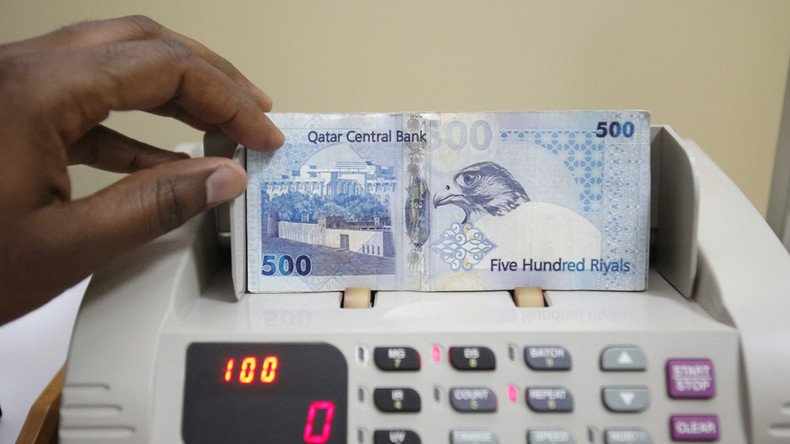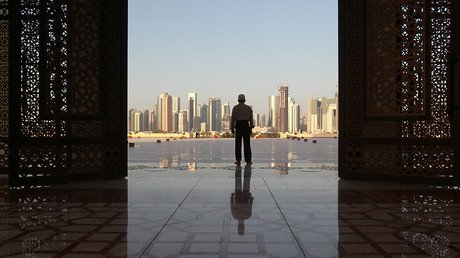Qatar to sue Arab state quartet for ‘siege’ damages, sets up new body to calculate losses

Doha is threatening to sue Saudi Arabia, the United Arab Emirates, Bahrain and Egypt for their ongoing blockade and has set up a special body to investigate claims and calculate the losses to the public and private sector as well as individuals.
The Compensation Claims Committee will study the degree of the economic damage suffered by Qatari nationals and business as a result of the ongoing diplomatic and economic blockade by the four Arab states.
READ MORE: Qatar ‘open’ to German intel in effort to clear up Arab states’ accusations
“This committee will receive all claims, whether, from the public sector, private sector or individuals,” Attorney General Ali bin Fetais al-Marri announced Sunday in Doha.
The newly created body, which includes the ministers of justice and foreign affairs, will handle cases and build evidence to file compensation claims to the implementers of the “blockade.”
“You have people who have sustained damages, businessmen who have sustained damages, banks which have sustained damages. As a result of this blockade,” al-Marri said, as quoted by AP.
“And those who compelled these damages to happen must pay compensation for them.”
The Attorney General did not specify which judicial body would handle any potential lawsuits, but said Doha will draw on international as well as domestic mechanisms to pursue their claims.
While the country is beginning to count the cost from the blockade that was imposed on June 5, the head of Qatar’s Chamber of Commerce and Industry said the “unjust siege” had a greater impact on those companies that lost the Qatari market.
Sheikh Khalifa bin Jassim bin Mohammed Al-Thani said Qatar had managed to easily compensate and has imported goods from “alternative countries,” Al Jazeera reported.
Apart from Iran and Turkey which have been supplying the country with much needed imports, the Sheikh said Doha has established imports from ports in Oman and India.
Despite growing pressure from the Arab quartet, petroleum and gas-rich Qatar remains confident and defiant that it can survive the isolation.
“We have sovereign wealth funds of 250 percent of the gross domestic product, we have Qatar Central Bank reserves, and we have a ministry of finance strategic reserve,” the country’s finance minister Ali Sharif al-Emadi told The Times earlier this week.
Speaking to CNBC news Sunday, the governor of the Qatari Central Bank (QCB) said his country is in good financial shape to deal with any "shocks".
"We don't believe that there is anything to worry about at this moment. What I can say is that our environment is proof to anybody that we are first of all solid, strong and resilient against any kind of shocks," Sheikh Abdullah bin Saoud Al Thani said.
Qatar to boost gas output regardless of Gulf diplomatic row https://t.co/jSnGecVqDs
— RT (@RT_com) July 4, 2017
On Thursday, the Saudi-led group upped the diplomatic ante, promising to impose additional “political, economic and legal measures” on Qatar for its alleged support of terrorism. Doha has firmly and repeatedly denied the allegations.
The threat of additional punitive measures came a day after Qatar rejected the 13-point ultimatum issued by the four Arab nations, which, among other demands, included severing ties with Iran, stopping aid for extremist groups, and shutting down its Al Jazeera global TV network.
The diplomatic and economic blockade was imposed on June 5. On June, 22, Saudi Arabia, the UAE, Bahrain and Egypt sent a list of 13 demands to Qatar, giving Doha 10 days to comply. On 1 July, Qatar said the demands were “unrealistic.” On 3 July, the ultimatum was extended for another 48 hours. The same day, Qatar handed its response to Kuwait, the intermediary in the crisis, but its contents were not revealed.
British Foreign Secretary Boris Johnson arrived in Qatar Saturday to help mediate in the Gulf fallout , although no details of his meeting with Qatar’s Foreign Minister Sheikh Mohammed bin Abdulrahman Al Thani were released. Previously, Johnson held talks in Saudi Arabia and Kuwait. US secretary of state Rex Tillerson arrives in Kuwait on Monday.













